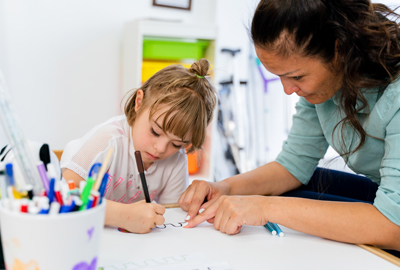Presentation Recap: Supporting Students with ADHD

At a recent CHADD meeting, Jennifer Cooper explored the challenges students with ADHD face as they transition into the school year and offered practical strategies for parents. She highlighted the importance of understanding ADHD as a neurodevelopmental condition, not a matter of laziness or bad parenting.
Key takeaways included:
- The Iceberg Effect: Behaviors seen “above the waterline” (fidgeting, blurting, forgetfulness) are often driven by underlying challenges “below the waterline” such as weak working memory, executive functioning difficulties, emotional regulation issues, anxiety or rejection sensitivity.
- Relationship First: A strong parent-child relationship is the foundation for helping children thrive. Build self-esteem, create a safe space at home and choose battles carefully.
- The Role of Neuroscience: ADHD brains have differences in dopamine regulation and executive functioning, making tasks like planning, focus and organization more difficult.
- Executive Function Growth: As children grow, parents can scaffold skills like planning, problem-solving, emotional regulation and independence through age-appropriate strategies.
- Screen and Dopamine Balance: Phones, games, and social media can over-activate the ADHD brain, making self-regulation harder. Replacing these “quick hits” with healthier rewards is key.
- Collaboration with Schools: Parents should partner actively with teachers, coach children to self-advocate, and seek resources like executive function coaches or learning centers.
Parent Tips by Age Group
Elementary School (Grades K–5)
Focus: Building routines, attention, and foundational executive skills.
Key Skills:
- Following two to three step instructions
- Learning to share, take turns and manage impulses
- Keeping track of belongings and schoolwork
- Beginning to take responsibility for tasks
Parent Tips:
Make routines VISIBLE and INTERACTIVE:
- Use picture charts or icons at child’s eye level.
- Color-code steps (e.g., yellow for morning routine, blue for bedtime).
- Set up stations for routines using painter’s tape or baskets.
- Use visual timers or music to signal transitions.
Gamify tasks: Beat the clock, superhero missions or earning points/tokens.
Consistent practice: Model routines and co-regulate during stressful moments.
Encourage independence gradually: Praise effort over results.
Simple tools: Whiteboards near the door, Alexa/Google reminders or watch alarms.
Middle School (Grades 6–8)
Focus: Increasing independence, flexible thinking and coping strategies.
Key Skills:
- Sitting for longer periods and shifting between classes
- Planning ahead and problem-solving
- Navigating peer relationships and social media
- Managing more materials and assignments
Parent Tips:
Planner or digital calendar: Track assignments, activities and deadlines.
Break down big projects: Use checklists or visual timelines.
Homework strategies:
- Use timers for work/break cycles.
- Create a dedicated homework station.
- Encourage audiobooks, speech-to-text and Grammarly for writing.
Encourage movement breaks to help focus.
Teach organization skills:
- Daily backpack cleanouts
- Color-coded folders for each subject
Peer support: Suggest study buddies or small group projects.
Practice self-advocacy: Role-play conversations with teachers.
High School (Grades 9–12)
Focus: Building long-term habits for independence and future readiness.
Key Skills:
- Flexible thinking and adapting to new rules and schedules
- Managing long-term projects and group work
- Handling stress and setbacks in healthy ways
- Self-monitoring productivity and performance
- Developing practical life skills
Parent Tips:
Executive Function Support:
- Visual reminders like colorful charts or photo checklists.
- Use organizing apps (Todoist, Shovel, Notion).
- Weekly backpack and digital folder cleanouts.
- Morning, after-school, and evening anchor routines (screen-free wind-down).
Academic Tools:
- Audiobooks and text-to-speech apps.
- Interactive study platforms like Quizlet or Khan Academy.
- Encourage teacher meetings and school resources like learning centers.
Self-awareness development:
- Strength-based focus: identify verbal, visual, memory or processing strengths.
- Journaling or digital note-taking for reflection.
Screen balance:
- Short, structured tech breaks.
- Replace high-dopamine screen time with movement, art or social play.
Collaborative problem solving: Work with your teen to set achievable goals.
Does your child with a learning difference need additional support? Reach out to Jewish Educational Services if they are in a Jewish day school or Macks Jewish Connection Network if they are in a public or private school.
Subscribe to our newsletter
The Associated is a home for everyone in the Baltimore Jewish community. We offer several email lists to help people find a community, engage with their peers and support Jewish journeys around the world.
Join Our Mailing ListAdd Impact to Your Inbox
Sign up for our newsletter
Subscribe to our newsletter
The Associated is a home for everyone in the Baltimore Jewish community. We offer several email lists to help people find a community, engage with their peers and support Jewish journeys around the world.
Join Our Mailing List









 Please Wait while we loading your video.
Please Wait while we loading your video.